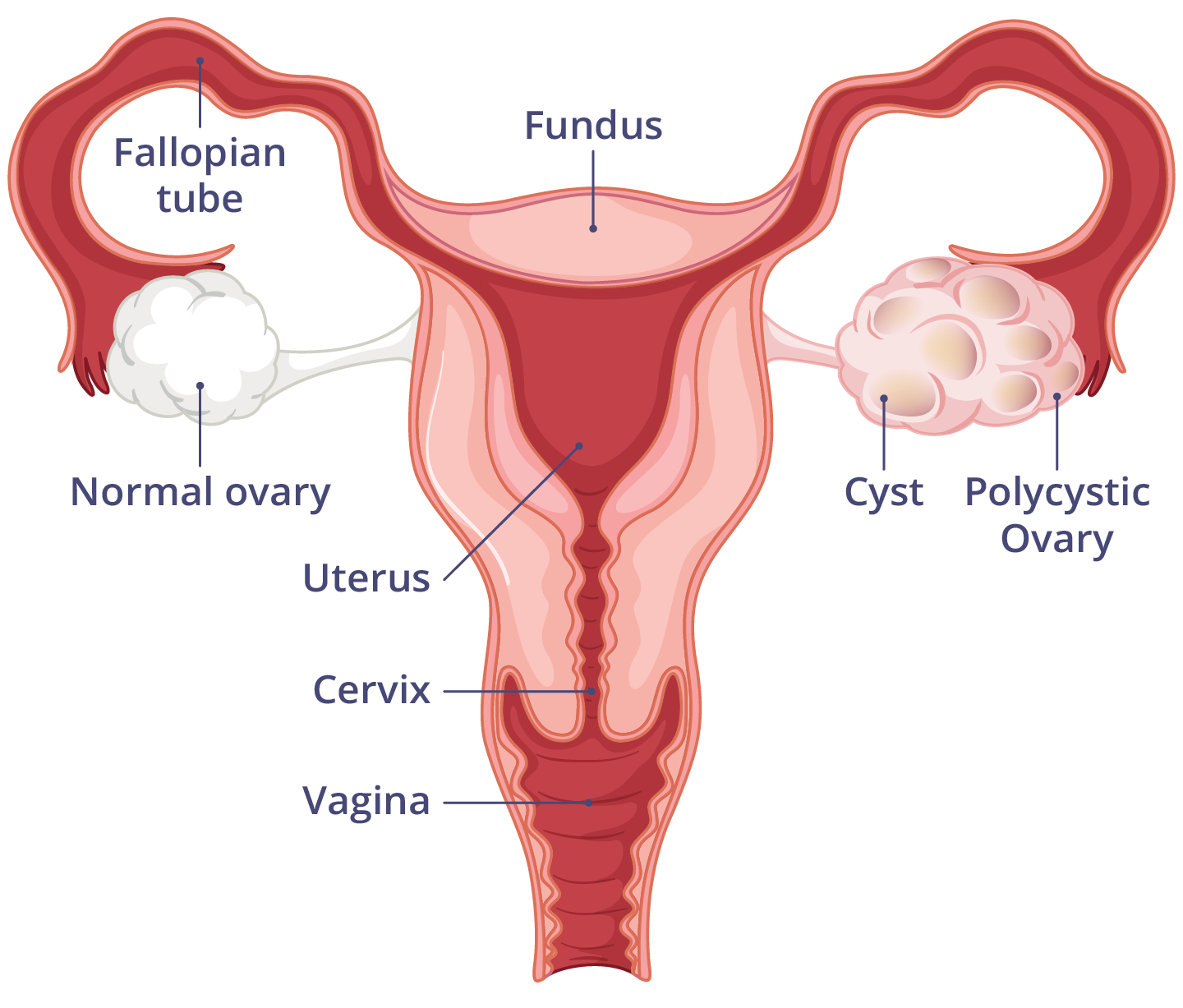PCOS and pregnancy
10-minute read
Key facts
- Polycystic ovary syndrome (or PCOS) is a hormonal condition that changes how your ovaries work.
- It is a common condition that affects around 1 in every 10 women.
- PCOS can affect your menstrual cycle and stop ovulation, making it harder to fall pregnant.
- Keeping to a healthy weight can help improve your chances of getting pregnant.
- If you have PCOS and are planning pregnancy, it’s best to talk to your doctor about your treatment options early in the process.
What is PCOS?
Polycystic ovary syndrome (or PCOS) is a common hormonal condition that changes how your ovaries work. It happens to around 1 in every 10 women. Many people with PCOS don’t know they have it. PCOS can be there but not diagnosed.
Women with PCOS often have small sacs filled with liquid (called cysts) on their ovaries. That's how polycystic ovary syndrome got its name. Polycystic means having many cysts.
PCOS can begin in your teenage years and make your periods less regular. You might also find it hard to conceive (fall pregnant).
Learn more about PCOS.

What are the symptoms of PCOS?
Common symptoms of PCOS include:
- missing or irregular menstrual periods
- living with overweight or obesity
- extra hair on your body or face
- oily skin with acne
You might not have all these symptoms — many people with PCOS have just one or two. It’s also possible to have PCOS and not have symptoms.
CHECK YOUR SYMPTOMS — Use the Symptom Checker and find out if you need to seek medical help.
What causes PCOS?
The cause of PCOS is not fully understood, but genetics and family history are thought to play an important role.
Many people with PCOS don't know they have it. This is because it can have similar symptoms to other conditions or have no symptoms at all.
Sometimes, people only find out that they have PCOS when they look into why they are having trouble getting pregnant.
How does PCOS affect my fertility?
PCOS can affect ovulation — this is when an egg is released from one of your ovaries.
If you have PCOS, you probably have high levels of hormones called androgens and insulin. This can stop your menstrual cycle completely or partly and cause problems with ovulation. Sometimes, an egg may not be released at all.
People with PCOS can:
- have children naturally
- it may take longer to get pregnant
- sometimes you may need medical help to become pregnant
Your fertility can be affected by many things, so it’s important to talk to your doctor about the causes.
How can I improve fertility if I have PCOS?
There are treatments and things that you can do that may help improve your fertility if you have PCOS.
Lifestyle
Staying healthy can help you have a better chance of getting pregnant. This includes:
- a balanced diet
- regular exercise
- weight loss
If you are overweight, your doctor will likely suggest losing some weight through healthy eating and an active lifestyle. Studies show that losing weight can help you ovulate regularly and improve your chances of getting pregnant.
Keeping a healthy weight can also lower your chances of complications during pregnancy.
To increase your chance of becoming pregnant, you can keep track of your ovulation. Look for signs that can help you track and predict ovulation, like changes to your body temperature and vaginal discharge. If you notice when you ovulate, try to have sex around that time each month.
Medical treatment
If lifestyle changes haven’t worked for you, your doctor will likely suggest starting fertility treatment. This may improve your chances of getting pregnant. Your doctor will help you decide which treatment is best for you. These treatments include:
- Metformin — which can help control the levels of sugar in your blood. It can also help some women with PCOS by lowering the level of androgens in your ovaries. Taking metformin may help your ovaries work better and make your periods more regular.
- Ovulation induction — these treatments help stimulate your ovaries, so they are more likely to release eggs. These are available as tablets or injections. Examples include, letrozole or clomiphene citrate which are available as tablets, and gonadotrophins which are given by injection.
Gonadotrophins are hormones that stimulate the growth and release of eggs. They are used after trying medicines like metformin or clomiphene citrate.
Before you start treatment with medicines, your doctor might suggest a test to check if your fallopian tubes are blocked or damaged. Blocked or damaged tubes could explain why you’re having trouble becoming pregnant.
LOOKING FOR A MEDICINE? — To search by brand name or active ingredient, use the Medicines information search feature.
Surgical treatment
If you have tried lifestyle changes and medical treatments and they have not worked, surgery might be an option. This includes:
- Laparoscopic ovarian surgery — this can help your ovaries work better and may restart or improve ovulation. During this keyhole surgery, the tissue in your ovaries that makes extra androgen hormones is removed.
- Assisted reproductive technology — which is an option if other treatments have not worked. This technology works better for women who have made lifestyle changes and are a healthy weight before starting treatment.
Can PCOS affect my pregnancy?
PCOS can make it harder for you to fall pregnant and give you a higher chance of pregnancy complications. So it’s important to see your doctor during pregnancy. Your midwife and doctor can keep a close watch on you to help prevent and manage any problems should they arise.
Your PCOS symptoms can also change based on things that affect your hormones, like being pregnant, or gaining or losing weight.
Are there possible complications of PCOS during pregnancy?
Having PCOS can increase your chance of having complications during pregnancy, such as:
- high blood pressure and pre-eclampsia
- gestational diabetes
- miscarriage
- premature birth
- caesarean birth
If you have PCOS, your baby may be larger than usual for their gestational age. This makes it more likely that you will need a caesarean birth.
Babies born to people with PCOS also have a higher chance of being admitted to a newborn intensive care unit.
If you have PCOS and are pregnant, it's important you talk to your doctor. You can reduce the chances of these pregnancy complications by:
- monitoring your PCOS symptoms
- taking extra care during your pregnancy
Some women with PCOS may also develop type 2 diabetes after pregnancy.
When should I see my doctor if I have PCOS and want to conceive?
If you have PCOS and are planning pregnancy, it’s best to talk to your doctor early.
You might want to consider trying to get pregnant or looking into fertility treatment sooner than other people. The chances of becoming pregnant decrease after age 35.
FIND A HEALTH SERVICE — The Service Finder can help you find doctors, pharmacies, hospitals and other health services.
Can PCOS be prevented?
As the cause of PCOS is not fully understood, it can’t be completely prevented. Factors like genetics may play a role.
Staying healthy can help lower your chance of developing complications. It’s important to take care of your symptoms and see your doctor for regular check ups.
Resources and support
Jean Hailes for Women's Health provides fact sheets on PCOS and how PCOS affects fertility and pregnancy.
Ask PCOS by National Health and Medical Research Council, Monash Health and Monash University provides helpful information about PCOS to help you manage it.
Hormones Australia offers information about PCOS.
Languages other than English
Jean Hailes for Women's Health offers fact sheets on PCOS in multiple languages.
Information for Aboriginal and/or Torres Strait Islander peoples
Jean Hailes for Women's Health provides resources on PCOS for Aboriginal and/or Torres Strait Islander people.

Speak to a maternal child health nurse
Call Pregnancy, Birth and Baby to speak to a maternal child health nurse on 1800 882 436 or video call. Available 7am to midnight (AET), 7 days a week.
Learn more here about the development and quality assurance of healthdirect content.
Last reviewed: October 2025






rendition-574c0b.png)
